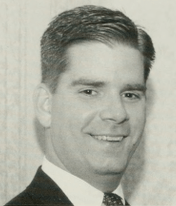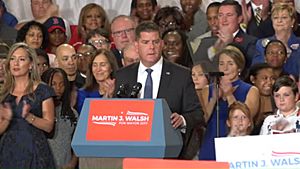Marty Walsh facts for kids
Quick facts for kids
Marty Walsh
|
|
|---|---|
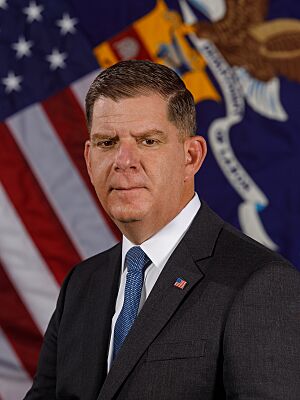
Official portrait, 2021
|
|
| 6th Executive Director of the National Hockey League Players' Association | |
| Assumed office March 13, 2023 |
|
| Preceded by | Donald Fehr |
| 29th United States Secretary of Labor | |
| In office March 23, 2021 – March 11, 2023 |
|
| President | Joe Biden |
| Deputy | Julie Su |
| Preceded by | Eugene Scalia Al Stewart (acting) |
| Succeeded by | Lori Chavez-DeRemer Julie Su (acting) |
| 58th Mayor of Boston | |
| In office January 6, 2014 – March 22, 2021 |
|
| Preceded by | Thomas Menino |
| Succeeded by | Michelle Wu Kim Janey (acting) |
| Member of the Massachusetts House of Representatives from the 13th Suffolk district |
|
| In office April 12, 1997 – January 3, 2014 |
|
| Preceded by | James T. Brett |
| Succeeded by | Daniel J. Hunt |
| General Agent of the Boston Building Trades Council | |
| In office January 2011 – April 2013 |
|
| Preceded by | James Coyle |
| Succeeded by | Brian Doherty |
| Personal details | |
| Born |
Martin Joseph Walsh
April 10, 1967 Boston, Massachusetts, U.S. |
| Citizenship | United States Ireland |
| Political party | Democratic |
| Spouse |
Lorrie Higgins
(m. 2024) |
| Education | Boston College (BA) |
Martin "Marty" Joseph Walsh (born April 10, 1967) is an American leader who has worked in politics and for workers' rights. He was the 58th mayor of Boston from 2014 to 2021 and the 29th United States Secretary of Labor from 2021 to 2023. As a member of the Democratic Party, Walsh has had a long career serving the public.
Before becoming mayor, Walsh was a member of the Massachusetts House of Representatives for 17 years. He also worked his way up to become a leader for construction workers' unions in Boston. In March 2023, he became the executive director of the National Hockey League Players' Association (NHLPA), the union that represents professional hockey players.
Contents
Early Life and Education
Marty Walsh was born on April 10, 1967, in the Dorchester neighborhood of Boston. His parents, John and Mary Walsh, were immigrants from Ireland. They came to the United States in the 1950s and married in 1959. Walsh grew up in a three-story home in Dorchester's Savin Hill area.
When he was seven years old, Walsh was diagnosed with a serious illness called Burkitt's lymphoma. He had to miss a lot of school and repeat the fifth grade. After years of medical treatment, he was cancer-free by age 11.
After high school, Walsh worked in construction. He later went back to school as an adult, taking night classes. In 2009, he earned a bachelor's degree from Boston College.
Career in Massachusetts Politics
Walsh's career in government began in his home state of Massachusetts. He served his community first as a state representative and later as the mayor of Boston.
State Representative (1997–2014)
In 1997, Walsh won a special election to become a state representative for the 13th Suffolk district, which included his neighborhood of Dorchester. He was reelected eight times, serving for a total of 17 years.
During his time in the state house, Walsh worked on many important issues. He was known for supporting same-sex marriage, calling his vote on the issue "the proudest vote I ever took." He also supported a major healthcare reform law in Massachusetts in 2006. This law aimed to make sure more people in the state had health insurance.
Mayor of Boston (2014–2021)
In 2013, Walsh ran for Mayor of Boston and won. He was reelected in 2017. As mayor, he focused on improving the city's economy and creating new opportunities for residents.
During his time as mayor, Boston saw a lot of new construction and development. Walsh worked with companies to bring jobs to the city. In 2016, he helped make a deal for General Electric to move its main office to Boston. He also supported policies to help city workers, such as giving them paid time off after having a child.
Walsh also dealt with major challenges. He worked to address the problem of homelessness in the city. When the COVID-19 pandemic began in 2020, he led Boston's response. He set up safety rules, provided regular updates to the public, and created funds to help people and businesses affected by the pandemic.
U.S. Secretary of Labor (2021–2023)
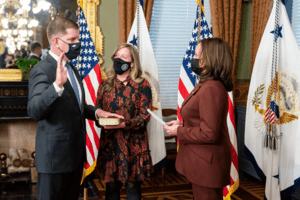
In January 2021, President-elect Joe Biden chose Walsh to be his United States Secretary of Labor. The U.S. Senate confirmed him in March 2021. The Secretary of Labor is in charge of the department that protects workers' rights, job safety, and wages.
Walsh was the first former union leader to hold this position in nearly 50 years. As secretary, he worked to help unions and protect workers. He visited workers on strike to show his support and helped settle disagreements between workers and companies. For example, he helped end a long strike by nurses in Massachusetts.
He also helped update rules to protect workers. One rule change made sure that workers who earn tips, like waiters, would receive the full minimum wage if they spent a lot of time on non-tipped tasks. Walsh left the position in March 2023 for a new role.
Leader of the NHL Players' Association (2023–Present)
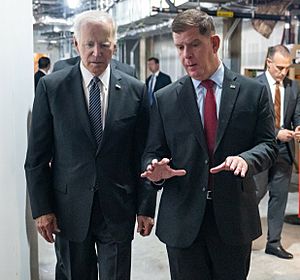
In March 2023, Walsh became the executive director of the National Hockey League Players' Association (NHLPA). The NHLPA is the union for all professional ice hockey players in the NHL. In this job, he represents the players in discussions with the league.
One of his first big achievements was helping to make an agreement for NHL players to compete in the 2026 and 2030 Winter Olympics.
In 2025, Walsh helped negotiate a new four-year contract between the players and the NHL. This contract, called a collective bargaining agreement, sets the rules for player salaries, game schedules, and working conditions. The new agreement will increase the minimum player salary to $1 million and expand the regular season from 82 to 84 games.
Personal Life
For many years, Walsh's partner was Lorrie Higgins. In March 2024, they got married. They live in the Lower Mills neighborhood of Dorchester in Boston.
Walsh is a Roman Catholic. He holds both American and Irish citizenship and can speak the Irish language. He is a big sports fan and has been a season ticket holder for the New England Patriots football team since 1994.
Images for kids
-
Walsh with U.S. Secretary of State John Kerry and a Chinese official at a climate summit in Beijing.
-
Walsh speaking at the 2022 AFL–CIO convention.
-
Walsh visits the Port of Long Beach in November 2021.
See also
 In Spanish: Marty Walsh para niños
In Spanish: Marty Walsh para niños
- Timeline of Boston, 2010s
- List of mayors of the 50 largest cities in the United States


